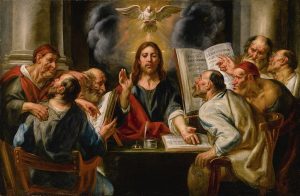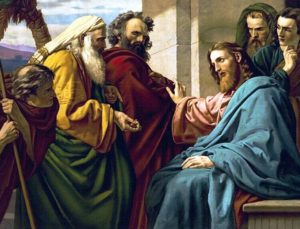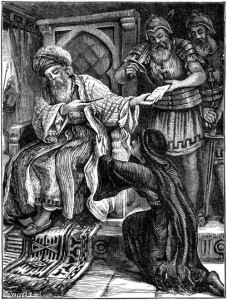Illuminations on the Lectionary readings for Nov. 9, 2025 (Pentecost 22C/Proper 27)

Christ among the Pharisees (c.1660-1670), oil painting on canvas by Jacob Jordaens (1593-1678). North Carolina Museum of Art. (Click image to enlarge.)
First Reading (Track One): Haggai 1:15b-2:9
Sunday’s readings remind us to place our hope and trust in God, even during hard times. In this first reading, we hear the minor prophet Haggai date his prophecy specifically in the second year of the reign of King Darius the Great of Persia, some 500 years before Christ. Darius was a successor to King Cyrus, who had released the people from Babylonian exile and sent them back to Jerusalem about 20 years before. The restoration of the city and the Temple proved to be a big job that couldn’t be done quickly. But Haggai calls the people to hang on to their courage and faith in God: Zion’s wealth and grandeur will be rebuilt in splendor even greater than the first Temple.
First Reading (Track Two): Job 19:23-27a
This first reading drops us into the middle of Job’s long talk with his friends, in which they try to figure out why so many bad things are happening to him. Job remains unpersuaded by their advice. He shouts in frustration, wishing that his words could be written in a book or even engraved on a rock forever. In words that Handel would set to memorable music in The Messiah, Job declares, “I know that my Redeemer lives, and that at the last he will stand upon the earth.” Whatever happens to him, in the end, Job expects justice and equity when he stands before God who will redeem him.
Psalm (Track One): Psalm 145:1-5, 18-22
The 150 Psalms offer a broad range of hope, lament, petition, and praise, a diverse anthology that spreads across many of the ways that God’s people approach the divine in worship and song. The six Psalms that conclude the book utter resounding and unalloyed praise. In this portion of Psalm 145, we can almost hear the chords and choruses as the people raise their voices in awe at God’s wonder: “Great is the Lord, and greatly to be praised!”
Alternate Psalm (Track One): Psalm 98
Psalm 98 is a song of praise too, focused on our joy over God’s faithfulness to the people and the marvelous things that God has done. Singing to the Lord a new song – a phrase that we also heard chanted in Psalm 149 in the All Saints readings last week – the Psalmist calls on all creation to join the chorus: The sea and all that is in it roars, the waters clap their hands, and the hills sing together with joy. God will judge the world with righteousness and its people with equity.
Psalm (Track Two): Psalm 17:1-9
Confident that he has done no wrong in the face of accusers, the Psalmist echoes the voice of Job, calling on God to hear his plea of innocence. This prayer, he insists, comes from lips that do not lie. Inviting God to weigh his heart and melt him down as an assayer judges gold, the Psalmist is confident that God will be just. “Keep me as the apple of your eye; hide me under the shadow of your wings,” he prays in the comforting words that we often hear in Compline at day’s end.
Second Reading: 2 Thessalonians 2:1-5, 13-17
This second letter to the Greek community in Thessalonica probably came a generation after the first, perhaps around 100 CE, and was surely written in Paul’s name by a later follower. Early Christians had expected that Christ would return very soon. But by this late date, many of them had died. Now the later generations were clearly hoping for some kind of reassurance, particularly since Christians still faced Roman persecution. The author urges them not to be deceived by false teachings of a “lawless one” but to stand firm, remember the Good News, and hold fast to good works and words.
Gospel: Luke 20:27-38
Luke frequently portrays contentious encounters between Jesus and the Temple leaders, Pharisees and Sadducees. In this passage, he is again debating Torah with a group of Sadducees who try to trip him up with a trick question: When a man who had seven wives dies and goes to heaven, they ask, which of the seven women will be his wife? At first impression, it seems that Jesus simply declares there is no marriage in heaven. But just as he does repeatedly in Luke’s Chapter 20, Jesus is simply pushing back against trick questions. God is not God of the dead but of the living, Jesus said; for to God, they are all alive.




